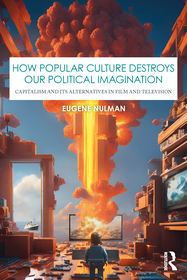
How Popular Culture Destroys Our Political Imagination
Capitalism and Its Alternatives in Film and Television
- Publisher's listprice GBP 36.99
-
17 671 Ft (16 830 Ft + 5% VAT)
The price is estimated because at the time of ordering we do not know what conversion rates will apply to HUF / product currency when the book arrives. In case HUF is weaker, the price increases slightly, in case HUF is stronger, the price goes lower slightly.
- Discount 10% (cc. 1 767 Ft off)
- Discounted price 15 904 Ft (15 147 Ft + 5% VAT)
Subcribe now and take benefit of a favourable price.
Subscribe
17 671 Ft

Availability
Estimated delivery time: In stock at the publisher, but not at Prospero's office. Delivery time approx. 3-5 weeks.
Not in stock at Prospero.
Why don't you give exact delivery time?
Delivery time is estimated on our previous experiences. We give estimations only, because we order from outside Hungary, and the delivery time mainly depends on how quickly the publisher supplies the book. Faster or slower deliveries both happen, but we do our best to supply as quickly as possible.
Product details:
- Edition number 1
- Publisher Routledge
- Date of Publication 29 November 2024
- ISBN 9781032847702
- Binding Paperback
- No. of pages272 pages
- Size 234x156 mm
- Weight 453 g
- Language English
- Illustrations 4 Illustrations, black & white; 1 Halftones, black & white; 3 Line drawings, black & white; 9 Tables, black & white 726
Categories
Short description:
How Popular Culture Destroys our Political Imagination: Capitalism and its Alternatives in Film and Television explores the representations of capitalism, the state, and their alternatives in popular screen media texts.
More
Long description:
How Popular Culture Destroys Our Political Imagination: Capitalism and Its Alternatives in Film and Television explores the representations of capitalism, the state, and their alternatives in popular screen media texts.
Acknowledging the problems that stem systemically from capitalism and the state, this book investigates an often-overlooked reason why society struggles to imagine alternative economic and political systems in our neoliberal age: popular culture. The book analyzes 455 screen media texts in search of critiques and alternative representations of these systems and demonstrates the ways in which film and television shape the way we collectively see the world and imagine our political futures. It suggests that popular culture is the answer to the question of why it is easier to imagine the end of the world than the end of capitalism.
Contributing to the areas of sociology, media studies, and utopian studies, this book provides insights into the topic of popular culture and politics in a theoretically informed and entertaining manner. The book will be useful to both students and scholars interested in these topics, as well as activists and organizers seeking to make the world a better place.
MoreTable of Contents:
Introduction
1. Neoliberalism, TINA, and the Titanic Effects
2. Research Methods
3. Eight Limited Critiques of Capitalism: Mapping the Terrain
4. Representations of Evil: A Cinematic Anthropology of Villains
5. Structural Critiques in Film and TV: Mr. Moneybags and the Hidden Abode
6. Representations of Crises, Colonialism, and Consumerism: Fat Cats, Starving Dogs, and Tulip Bulbs
7. Transferable Radicalness: Alternative Lifestyles in Film and TV
8. Radical Resistance in The Lego Movie: The Building Blocks of Utopia
9. Utopian Conclusions: Yesterday, Today, & Tomorrowland
Appendix I: Films/Television Programs Analyzed
More




